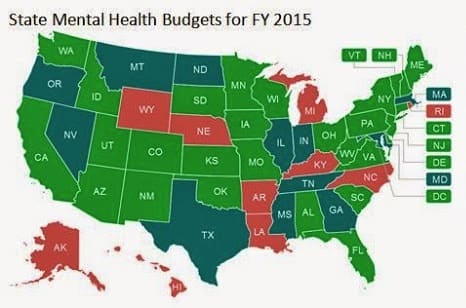December 11, 2014
 State Mental Health Budgets for FY 2015
State Mental Health Budgets for FY 2015NAMI just released a report highlighting what went on in state legislatures in 2014 across the country when it comes to mental health issues. The report, State Mental Health Legislation 2014 shows that investment in mental health services slowed from last year and that when progress was made around specific policy issues much of the legislation felt like it only skimmed the surface.
This year, only 29 states and the District of Columbia increased funding for mental health services. Overall, the mental health care system still simply needs to recover lost ground from the state budget cuts of 2009-2012. But reinvestment is unsteady. See where your state fell in investment this year below.
There were some victories this year. Minnesota, Virginia and Wisconsin were leaders in the country by passing measures that can serve as models for other states in areas such as workforce shortage, children and youth, school-based mental health, employment and criminal justice.
Our policy recommendations for states in 2015 are:
What can you do?
Contact your Governor and State Legislators to let them know that they need to make mental health care a priority.
Connect with your local NAMI to see how you can help advocate for mental health services and supports in your community.
We’re always accepting submissions to the NAMI Blog! We feature the latest research, stories of recovery, ways to end stigma and strategies for living well with mental illness. Most importantly: We feature your voices.
LEARN MORENAMI HelpLine is available M-F, 10 a.m. – 10 p.m. ET. Call 800-950-6264,
text “NAMI” to 62640, or email. In a crisis, call or text 988 (24/7).